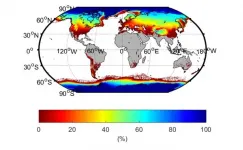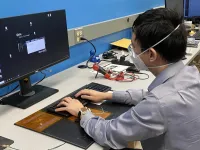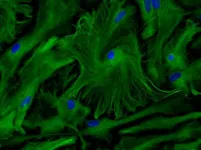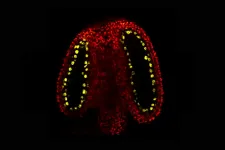Don't worry, the kids are cool if you cash in on their inheritance
2021-07-01
(Press-News.org) Cash in on the kids' inheritance and spend up big on the retirement plans - that's the message coming from the University of South Australia as new research reveals that older people are keen to spend their well-earned savings, rather than passing them on to their kids.
And while it may seem like bad news for the younger generation, the research also confirms that the kids are just fine with this scenario, claiming that no one owes anyone anything.
The surprising findings are part of a new study that explores contemporary attitudes towards wealth transfer taxation in Australia, finding that public resistance to inheritance and estate taxes may have declined in the 40 years since they were abolished in Australia.
Inheritance is the only major form of income that is untaxed in Australia - a person who works for their income pays tax on it while someone who receives a bequest is not even liable for capital gains tax.
Social policy expert, Dr Veronica Coram from UniSA's Australian Alliance for Social Enterprise says the apparent decline in the bequest motive presents a significant opportunity for Australian tax reform, and a valuable chance to address social inequalities.
"There's nothing more certain than death and taxes. But while people generally assume the combination is notoriously unpopular, our research suggests otherwise," Dr Coram says.
"We talked to young adults and senior Australians and two thirds of them thought Australia should consider reintroducing taxes on estates worth more than $3m, while only one in ten were definitely opposed.
"The lack of interest in giving or receiving inheritances meant that most participants saw no reason to object to estates being taxed, which opens potential opportunities for much-needed tax reform.
"Inheritances generally go to people who are already well-off and don't need them; they encourage inequality and inhibit social mobility.
"The Australian government needs to find ways to raise revenue to support increased spending demands generated by COVID-19, an ageing population, pressure on health systems and increasing environmental disasters.
"Reintroducing inheritance or estate taxation is a way of increasing government revenue, while reducing a key driver of inequality at the same time."
While politicians and policymakers may be wary of making moves, Dr Coram says the findings reflect changes to social norms in Australia and other OECD countries.
"Historically, inheritance taxes have been considered 'political suicide'. But perhaps their time has come, ironically due to a growing individualism and associated decline in the assumption that family members should provide for one another," Dr Coram says.
"More research on changing views towards redistributive policy is required, but the results of our study suggest that if governments are considering tax reform, they should not assume that Australians are vehemently opposed to wealth transfer taxation."
INFORMATION:
Media contact: Annabel Mansfield T: +61 8 8302 0351 M: +61 417 717 504
E: Annabel.Mansfield@unisa.edu.au
Researcher: Dr Veronica Coram M: +61 410 161 823
E: Veronica.Coram@unisa.edu.au
ELSE PRESS RELEASES FROM THIS DATE:
2021-07-01
LA JOLLA, CA--Researchers at La Jolla Institute for Immunology (LJI) have found that T cells from people who have recovered from COVID-19 or received the Moderna or Pfizer-BioNTech vaccines are still able to recognize several concerning SARS-CoV-2 variants.
Their new study, published online on July 1, 2021 in Cell Reports Medicine, shows that both CD4+ "helper" T cells and CD8+ "killer" T cells can still recognize mutated forms of the virus. This reactivity is key to the body's complex immune response to the virus, which allows the body to kill infected cells and stop severe infections.
"This study suggests that the impact of mutations ...
2021-07-01
WASHINGTON--The global cryosphere--all of the areas with frozen water on Earth--shrank by about 87,000 square kilometers (about 33,000 square miles), a area about the size of Lake Superior, per year on average, between 1979 and 2016 as a result of climate change, according to a new study. This research is the first to make a global estimate of the surface area of the Earth covered by sea ice, snow cover and frozen ground.
The extent of land covered by frozen water is just as important as its mass because the bright white surface reflects sunlight so effectively, cooling the planet. Changes in the size or location of ice and snow can alter air temperatures, change the sea level and even affect ocean currents worldwide.
The new study is published in Earth's ...
2021-07-01
People lived without plastic until the last century or so, but most of us would find it hard to imagine how.
Plastics now are everywhere in our lives, providing low-cost convenience and other benefits in countless applications. They can be shaped to almost any task, from wispy films to squishy children's toys and hard-core components. They have shown themselves vital in medicine and have been pivotal in the global effort to slow the spread of the COVID-19 pandemic over the past 16 months.
Plastics seem indispensable these days.
Unfortunately for the long-term, they are also nearly indestructible. Our planet now bears the weight of more than seven billion tons ...
2021-07-01
As smart watches are increasingly able to monitor the vital signs of health, including what's going on when we sleep, a problem has emerged: those wearable, wireless devices are often disconnected from our body overnight, being charged at the bedside.
"Quality of sleep and its patterns contain a lot of important information about patients' health conditions," says Sunghoon Ivan Lee, assistant professor in the University of Massachusetts Amherst College of Information and Computer Sciences and director of the Advanced Human Health Analytics Laboratory.
But that information can't be tracked on smartwatches if the wearable devices are ...
2021-07-01
Over years of studying antibody responses against the flu in the Wilson lab at the University of Chicago, researchers kept coming up with a strange finding: antibodies that seemed to bind not only to the flu virus, but to every virus the lab could throw at them. Since antibodies are usually highly specific to individual pathogens, in order to maximize their targeted protective response, this pattern was extremely unusual.
Until finally, they realized: The antibodies weren't responding to the viruses, but rather to something in the biological material in which the viruses had been grown. ...
2021-07-01
Astrocytes are cells in the brain which have long been considered only as mere support cells for neurons. In recent years, the study of astrocytes has grown, gradually revealing their importance in brain function. Researchers from Inserm, CNRS and Collège de France at the Center for Interdisciplinary Research in Biology have now uncovered their crucial role in closing the period of brain plasticity that follows birth, finding them to be key to the development of sensory and cognitive faculties. Over the longer term, these findings will make it possible to envisage new strategies for reintroducing brain plasticity in adults, thereby promoting rehabilitation following brain lesions or neurodevelopmental disorders. This research has been published in Science.
Brain plasticity is ...
2021-07-01
Hereditary information is passed from parent to offspring in the genetic code, DNA, and epigenetically through chemically induced modifications around the DNA.
New research from the John Innes Centre has uncovered a mechanism which adjusts these modifications, altering the way information beyond the genetic code is passed down the generations.
DNA methylation, one example of these epigenetic modifications, happens when a methyl group or chemical cap is added to the DNA, switching a gene, or genes, on or off.
As germline (eggs and sperm) cells develop some of the methyl markers are reset, affecting the information passed onto the next generation.
How this process ...
2021-07-01
Although plastics have become an essential material, permeating almost all aspects of modern living, many of the inherent properties that make them useful in such a wide variety of applications also make them a serious environmental threat. In a special issue of Science, "Our Plastics Dilemma," four Reviews, two Perspectives, a Policy Forum, an associated Report and two News features examine a wide range of topics related to plastics and the problems they present. "As for much new technology, their development and proliferation occurred with little consideration for their impacts, but now it's impossible to deny their dark side as we confront a rapidly ...
2021-07-01
Through the sequencing of more than 640,000 human exomes, researchers identify rare gene coding variants strongly associated with body mass index (BMI) - including the variant GPR75, which conferred protection from obesity in mouse models. Not only do the findings provide potential therapeutic targets for treating obesity, but they also demonstrate the power and versatility of massive-scale exome sequencing in discovering rare coding variants that could offer new and potentially translatable biological functions. Body fat is a highly heritable trait and the obesity to which body ...
2021-07-01
Researchers could not confirm that a feature that supposedly signals the presence of Majorana bound states - the unusual quasiparticles that may become the cornerstone of topological quantum computing - was in fact due to elusive Majorana particles, in full-shell semiconductor/superconductor nanowires. Rather, this feature, known as zero bias conductance peak, can arise from another quantum phenomenon in these hybrid nanowire structures, the authors say. In recent years, intense research has been conducted on nanowire-based semiconductor-superconductor hybrid systems because predictions suggest that a topological superconductor state with Majorana zero modes (MZMs) can be engineered from them. Even though several experiments in such platforms have reported ...
LAST 30 PRESS RELEASES:
[Press-News.org] Don't worry, the kids are cool if you cash in on their inheritance





